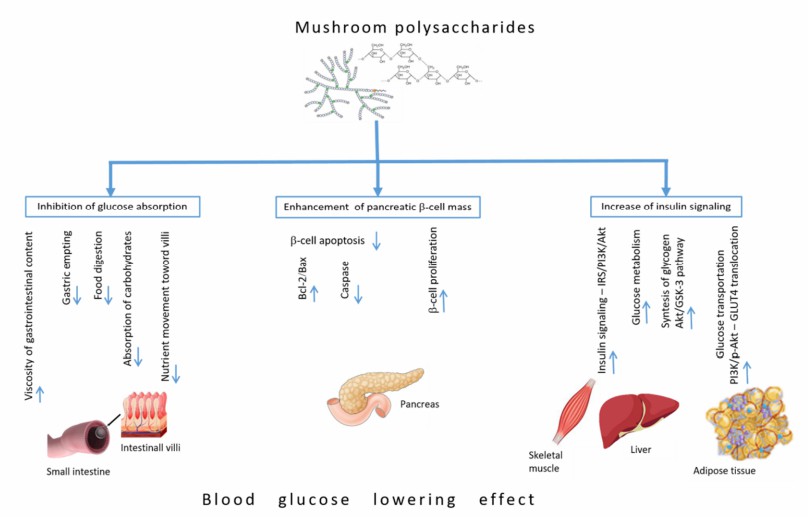Diabetes is a metabolic disease that affects millions worldwide and can be life-threatening. However, current drugs may have harmful side effects and fail to significantly modify the course of diabetic complications, so natural antidiabetic drugs derived from medicinal plants have attracted great attention.
Lifeasible provides one-stop preclinical research services for diabetes drug development based on mushroom active compounds. Our services range from the discovery of active compounds that regulate blood sugar to preclinical animal studies.
Blood Sugar Regulation Mechanism of Mushrooms
Medicinal mushrooms have been targeted as potential hypoglycemic and antidiabetic agents from ancient times. Polysaccharides, proteins, dietary fibers, and other biomolecules isolated from medicinal, edible, or nontoxic mushrooms have already proved their blood glucose-reducing proficiency both in in-vivo and in-vitro models. They revealed that treatment with mushroom polysaccharides displayed an anti-hyperglycemic effect by inhibiting glucose absorption efficacy, enhancing pancreatic β-cell mass, and increasing insulin-signaling pathways. Mushroom terpenoids act as inhibitors of α-glucosidase and as insulin sensitizers through activation of PPARγ to reduce hyperglycemia in animal models of diabetes.
 Fig. 1 Anti-hyperglycemic mechanisms of mushroom polysaccharides in different tissues involved in glucose homeostasis. (Aramabašić J J, et al., 2021)
Fig. 1 Anti-hyperglycemic mechanisms of mushroom polysaccharides in different tissues involved in glucose homeostasis. (Aramabašić J J, et al., 2021)
Our Services
Lifeasible provides a variety of preclinical research services for the development of diabetes drugs based on mushroom extracts. Our services include but are not limited to the following:
Mushroom active compounds extraction and separation services
Structure-activity relationship research service
Investigating the relationship between the structure of active compounds in mushrooms and their activity in regulating blood sugar.
Mechanism research service
Lifeasible can provide a variety of validated diabetes disease models to screen and evaluate the hypoglycemic effect of drugs. The following models are for reference only:
|
Type Ⅰ diabetes models |
Type Ⅱ diabetes model |
- Immediate type Ⅰ diabetes induced by streptozotocin
Suitable for the study of pathogenesis, and pathophysiological changes, as well as drug screening, and pharmacodynamic evaluation.
- Non-obese diabetic mouse model
A good animal model for studying the genetics, immunology, and virological characteristics of type Ⅰ diabetes, its prevention and treatment, etc.
- BB rat model
BB rats are the animal model of choice for inducing tolerance to islet transplantation and have been used for intervention and genetic studies of diabetic neuropathy. |
- Type Ⅱ diabetes induced by a high-fat diet
An ideal animal model for studying type Ⅱ diabetes and its chronic vascular complications.
- DB/DB diabetes mutant gene mouse model
Similar to the phenotype of human diabetic patients.
- ZDF rat model
Suitable as an animal model for type Ⅱ diabetes with hypertension. |
Model Evaluation Indexes
- Weight detection
- Detection of blood biochemical indicators
- Urine testing
- HE staining and periodic acid-Schiff’s detection: 1) Glomerulosclerosis 2) Tubulointerstitial damage
- Insulin dependence evaluation index
- Long-term monitoring: glycosylated hemoglobin, fructosamine, etc.
- Glucose tolerance test: 1) DDP-4 activity level 2) GLP-1 level
Advantages of Our Services
- We can provide a variety of diabetes models, and we have extensive experience in building diabetes models.
- Professional extraction and separation team.
- We can provide high-quality customized services for project requirements.
Contact Us
Lifeasible provides preclinical research services for diabetes drug development based on mushroom extracts, helping advance the process of mushroom bioactive compounds from discovery to preclinical animal studies. If you are interested in our research services, please contact us.
Reference
- Aramabašić, J.J.; et al. The effects of major mushroom bioactive compounds on mechanisms that control blood glucose level. Journal of Fungi. 2021, 7(1): 58.
For research or industrial raw materials, not for personal medical use!


 Fig. 1 Anti-hyperglycemic mechanisms of mushroom polysaccharides in different tissues involved in glucose homeostasis. (Aramabašić J J, et al., 2021)
Fig. 1 Anti-hyperglycemic mechanisms of mushroom polysaccharides in different tissues involved in glucose homeostasis. (Aramabašić J J, et al., 2021)